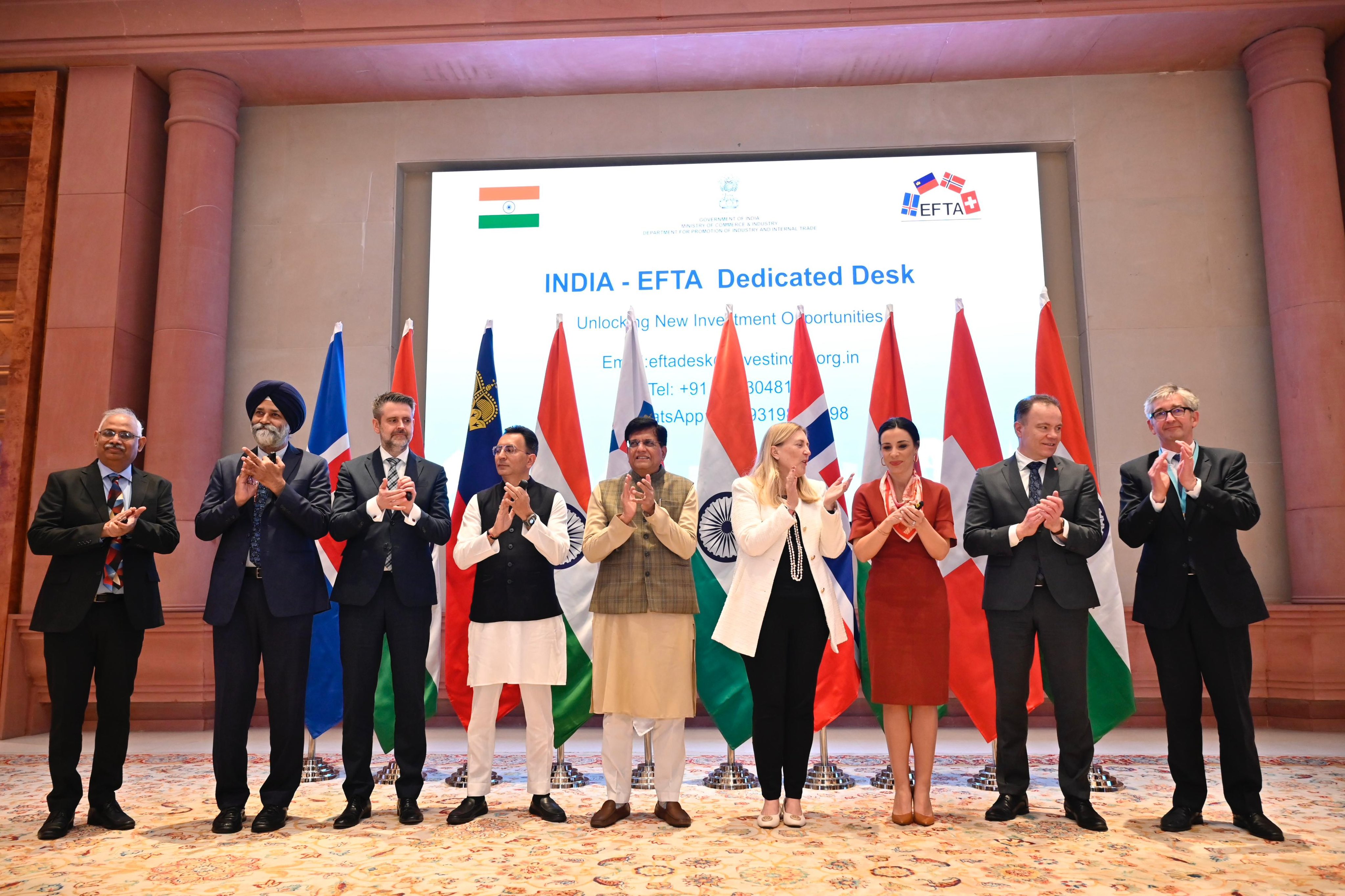New Economic Path Forged with Launch of India-EFTA Desk Following Landmark Trade Pact
Union Minister for Commerce and Industry, Shri Piyush Goyal, hailed TEPA as a "landmark agreement," underscoring India's ascending role in the global trade landscape.

- Country:
- India
India and the European Free Trade Association (EFTA) – comprising Switzerland, Norway, Iceland, and Liechtenstein – have embarked on a new chapter of economic collaboration with the official inauguration of the India-EFTA Desk. This pivotal initiative follows the recent conclusion of the India-EFTA Trade and Economic Partnership Agreement (TEPA), marking EFTA as the first European bloc to formalize a trade pact with India.
Union Minister for Commerce and Industry, Shri Piyush Goyal, hailed TEPA as a "landmark agreement," underscoring India's ascending role in the global trade landscape. “This desk will serve as the bridge between businesses on both sides, ensuring transparency, trust, and ease of doing business,” he stated. Goyal also emphasized India’s ambition to surpass $100 billion in EFTA investments, reflecting the country's commitment to fostering equitable and mutually beneficial trade relationships.
Strategic Role of the India-EFTA Desk
The newly inaugurated India-EFTA Desk is designed to provide structured support to EFTA businesses seeking to invest, expand, or establish operations in India. High-ranking dignitaries from all four EFTA nations attended the launch event, reaffirming their countries’ commitment to deepening economic ties with India.
Switzerland’s State Secretary for Economic Affairs, Ms. Helene Budliger Artieda, lauded TEPA as a “new chapter for investment promotion and cooperation.” She highlighted over CHF 10 billion in Swiss foreign direct investment (FDI) that has already created more than 146,000 jobs in India, particularly in the manufacturing sector. Artieda projected a surge in investments across precision industries, chemicals, food processing, and pharmaceuticals, and suggested that establishing an Invest India office in Switzerland could further catalyze investment flows.
Norway’s State Secretary of Trade and Industry, Mr. Tomas Norvoll, likened TEPA to an airport, with the India-EFTA Desk serving as the “landing strip” for businesses. He noted that the number of Norwegian companies operating in India has doubled over the last decade, while Norway’s sovereign wealth fund assets in the country have reached an impressive $31.4 billion.
Iceland’s Permanent Secretary for Foreign Affairs, Mr. Martin Eyjolfsson, called TEPA “the most significant trade agreement EFTA has signed in decades,” reinforcing India’s position as a key economic partner for Europe. Eyjolfsson emphasized growing cooperation in renewable energy, seafood, and pharmaceuticals, positioning TEPA as a stabilizing force amid ongoing global economic uncertainties.
Liechtenstein’s Minister of External Affairs, Education, and Sport, Ms. Dominique Hasler, stressed the Desk’s role in facilitating high-value manufacturing and innovation-driven industries. She cited the success of Hilti, a Liechtenstein-based company, in India and expressed optimism that TEPA would encourage more Liechtenstein firms to expand their operations in the country.
Driving Investment and Innovation
The India-EFTA Desk is poised to drive significant investment in key sectors such as renewable energy, life sciences, engineering, and digital transformation. Secretary of the Department for Promotion of Industry and Internal Trade (DPIIT), Shri Amardeep Singh Bhatia, noted that TEPA would spur joint ventures, small and medium-sized enterprise (SME) collaborations, and technology partnerships, with the Desk streamlining regulatory processes for EFTA businesses.
Union Minister of State, Shri Jitin Prasada, highlighted EFTA’s strategic importance to India’s development goals. He cited Norway’s expertise in green shipping, Switzerland’s advancements in rail networks, Iceland’s leadership in geothermal energy, and Liechtenstein’s high-value manufacturing. Prasada also pointed to academic collaborations, such as research partnerships between Indian Institutes of Technology (IITs) and the Arctic University of Norway, demonstrating TEPA’s broad scope beyond traditional trade.
Business Roundtable Sets the Stage for Future Collaborations
Following the Desk’s inauguration, a high-level Business Roundtable chaired by Shri Piyush Goyal convened to explore new opportunities and address potential trade challenges. The discussions identified key sectors for collaboration, including seafood and maritime industries, renewable energy, financial services, pharmaceuticals, engineering, and food processing.
Looking ahead, the India-EFTA Desk will serve as the primary channel for fostering continuous dialogue between businesses and governments. The Indian government has pledged to work closely with EFTA partners to unlock TEPA’s full potential. Concluding the roundtable discussions, Shri Piyush Goyal referred to TEPA as a “model agreement” and reaffirmed India’s readiness to build a robust future with EFTA. “India is ready when you are. Let’s build this future together,” he stated.
A New Era of Economic Cooperation
With the official launch of the India-EFTA Desk, both regions have entered a new era of economic cooperation. This partnership aims to ensure that businesses from India and EFTA thrive in an era of sustainable and innovation-driven growth, setting a precedent for future international trade agreements.










